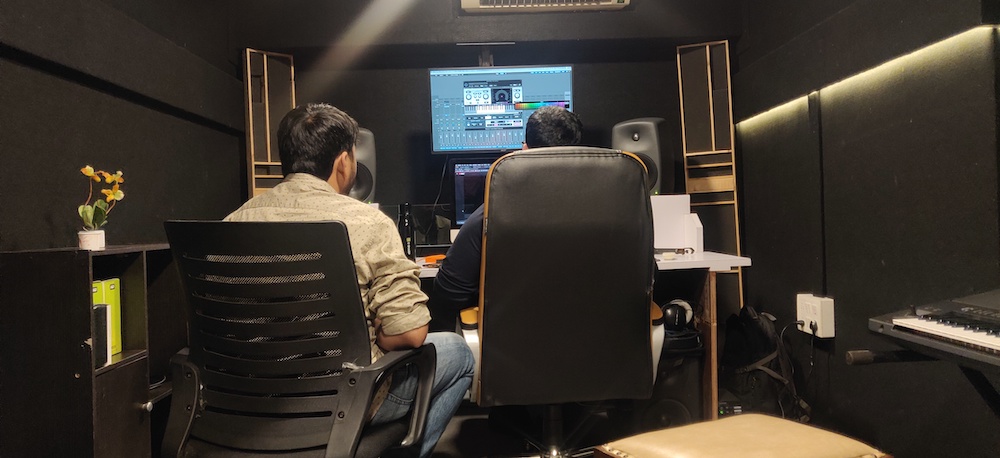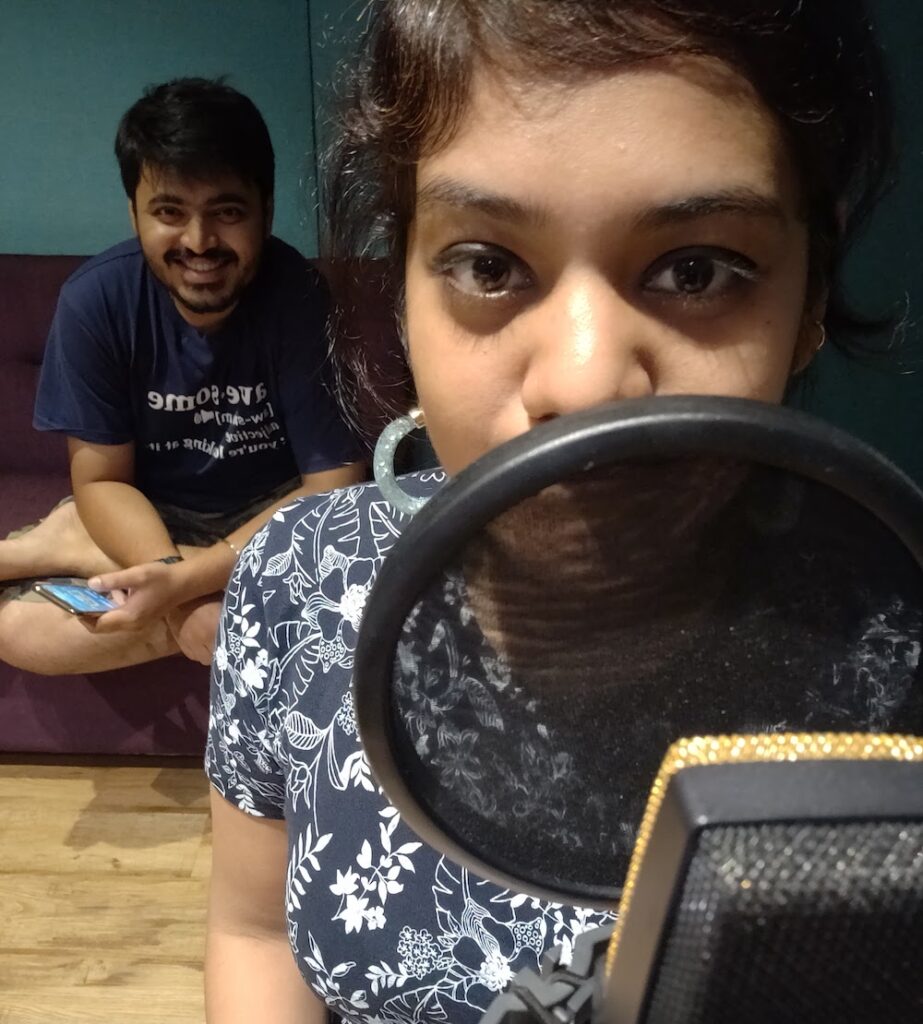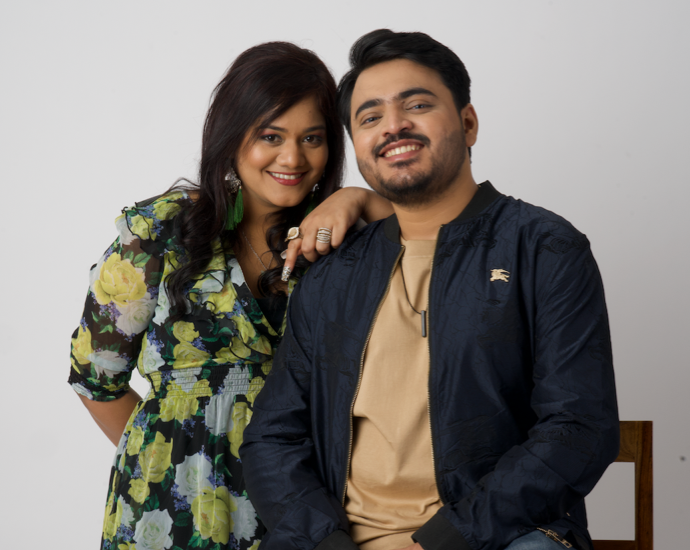Digging into the creative process, Byta speaks with artists, musicians, producers, DJs and anyone involved with music creation. A conversation about how they create, collaborate and share music. From studio setups to routines, and the first person to hear about the next 'big' work.
Where are you based?
We are based out of Mumbai, Bharat.
How, when and where did you start making music? Are you primarily a musician or a producer, or do something else?
Pragya: We met through one of our common friends. Back in 2016, I used to host an online music talk show for a video app. I was preparing for an exclusive show where I wanted to host a guest who is a good vocalist and equally witty and funny (that was the need of the topic). Since I was very new in the music industry, I did not know many artists, which is when I asked one of our friends for a reference and he suggested that Abhimanyu would be a right fit for a show like that.
Abhimanyu: It was our first chat show together and we ended up sharing this amazing equation as fellow artists. The show became a top hit amongst the viewers. Our listeners loved our chemistry. After a few days of hanging out and hosting these chat shows together, we started performing live as a duo. Yes we started off as two vocalists – “The Two Buddies”. Later in 2018, one evening, while we were preparing our future content, I was playing the guitar and hummed a fresh tune. Pragya added on to it and we hummed the hook line together. We hired a music producer to do the job. He nailed it and just like that we had our first original song as a duo. People who heard it, loved it. Honestly, we thought it was beginner’s luck but it kept happening and we kept making songs and haven’t stopped since!
We were broke when we started. That meant learning music production was to be done on our own. This is how we started and we are so glad we did.
Who would you consider some of your biggest influences when it comes to your “sound”?
Abhimanyu: Pragya and I have a very distinct taste in music. I am more of a world music kinda person and Pragya has a strong Indian classical music background. I listen to a lot of artists around the world. That enables me to explore musical realms which are very different from Indian Classical/Bollywood music in terms of sound. As we bring both things together, it gives a different flavour to our tunes. Some of my favourite artists are FKJ, Jacob Collier, Skrillex, Eminem, Pegboard Nerds, Kupla, Flume and the like.
Pragya: I have grown up listening to a lot of Indian artists. My musicality is hugely influenced by Indian artists like Asha Bhosle, Lata Mangeshkar, Kishore Kumar, Sonu Nigam. As for the sound, I love listening to different types of music now, thanks to Abhimanyu, and I take inspiration from all those songs and artists. The more I listen, the more I learn.
Explain your creative process. Do you have a routine?
Abhimanyu: It’s actually a mixed process. There have been times when we have composed the tune first and then written the lyrics or vice versa. It completely depends on our vibe at the time.
Pragya: We are night owls. Ideas start floating in when we are working at night as there is some respite from the otherwise noisy day. As for our schedule, it totally depends. If we are too engrossed or invested or have a deadline, we can stay awake and keep working OR we can have a cup of coffee and a cup of tea and keep it chill.
What is your “studio” setup?
Abhimanyu: Depending on the project or nature of work, we operate out of our home studios or a professional studio. We produce music & record our vocals on Logic Pro X. We tried keeping our home setups rather minimalistic and humble with an iMac and a Macbook Pro complete with a soundcard from Focusrite and Steinberg and our vocal mic from Rode and Instrumental mic from AKG. The monitors from Yamaha do the job pretty well by giving us as close to a complete flat sound as possible.

What is your process when working with other people? How is collaboration different in the studio vs working remotely?
Abhimanyu: Just like it was for the rest of the world, for us, the idea of working remotely came in with Covid. Before that, we used to work together in the studio. With Covid, the idea of remote working became prevalent and with time, we adapted to it. As of today, we can work in the studio together or remotely, whatever the situation demands.
Pragya: Yes. If we have time in hand, we would like to sit together and work to create a more inclusive environment. Otherwise, we would have a quick video call or voice call, discuss the details and start working independently and bring it all together later.
Abhimanyu: Studio time is when the ideas flow more freely whereas our home setup ensures total comfort in terms of space.
At what point(s) are you comfortable letting other people hear what you are working on?
Pragya: We have a mixed bunch of friends. Some are musicians while most are not. To our musician friends, we can play a track when we have a rough production and scratch recording in place. But to our non-musician friends, we play nothing short of a premix.
Do you share your work in progress (streams or downloads)? Any technical frustrations?
Abhimanyu: Of course we do. We do not share initial drafts but do share the ones that are a little more than halfway there with our friends and family. Sometimes, it helps us give a better direction to our music.
How do you know when a track/album is finished?
Abhimanyu: Once we are completely happy with the mix. Until then, there have been scenarios where we have often tweaked the production or vocals during the mix stage. It’s a constant process. But we usually get to know in our hearts, once it’s done.

How do you listen to the final mixes/mastered work?
Pragya: We let our mixing engineer work without our constant involvement, giving him complete freedom to work on the track. Once done, the drafts are heard on different devices and different settings. We hear it in our studios or the engineer’s studio, we hear it on our headphones or earbuds, we also hear it in our car (very important) and even the mobile phone’s speakers which is what most people in Bharat use to listen to music.
How important is pre-release security when sharing new work?
Abhimanyu: As of today, we have never had any bad experiences but pre-release security is very important. Bad experiences don’t warn you before knocking on your door. To safeguard our work, we are both registered with MCAI (Music Composer’s Association of India) as songwriters and music composers. Before pitching our work or sending it online, we get our work registered with MCAI so that our songs are safeguarded and not open to exploitation.
Who on your team gets to hear the final versions first and why, what formats do they each need?
Pragya: Mostly our family gets to hear our tracks first and then our friends, apart from the team members who have directly worked on the song.
Outside of your inner circle who are the people that will need to hear the new tracks next?
Pragya: You are not going to believe this. But there’s this cafe in our locality where we are regulars. We go to random strangers and ask them for feedback. It’s so random that sometimes the results surprise even us. We love it.
Anything you are working on, anyone you are working with and want to share?
Abhimanyu: We have a series of originals coming up with a major Indian label. It’s an album of 8 songs – all from different genres and we are looking forward to the release of these songs as these include some of our early work as music composers. These songs are very close to our hearts.

